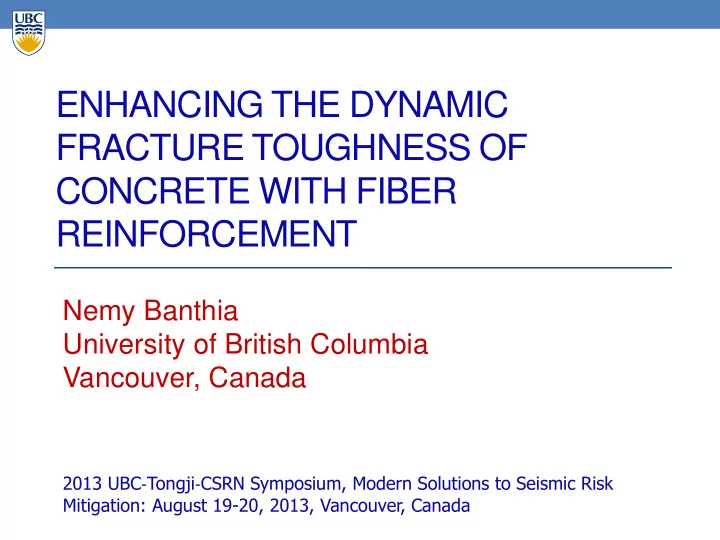

ENHANCING THE DYNAMIC FRACTURE TOUGHNESS OF CONCRETE WITH FIBER REINFORCEMENT Nemy Banthia University of British Columbia Vancouver, Canada 2013 UBC ‐ Tongji ‐ CSRN Symposium, Modern Solutions to Seismic Risk Mitigation: August 19-20, 2013, Vancouver, Canada
Fiber Reinforced Concrete (FRC) Outline: Eco-Friendly Ductile Cementitious Composites (EDCC) Infrastructure Deterioration and Interest in Durable Cementitious Composites FRC for Sensing and Smart Structures Closure
Fibers for Concrete Use Deformed Steel Polyester Fiber Carbon Spectra HDPE Basalt fiber Cellulose fiber Carbon Fiber fiber
Production of Fiber Reinforced Concrete
Fiber Reinforcement and Crack Bridging Fibers
Applications
Fiber Matrix Interaction, Mechanisms of Reinforcement and Bond Optimization Contact angle: 80 o (a) untreated PP plate surfaces. V ( L / 2 ) cos f f ( w ) f ( , w ) p ( ) p ( z ) dzd tension 2 d / 4 0 z 0 f Contact angle: 7 o (b) plasma treated PP plate surfaces.
Bending Response: Hardening and Softening Deflection (mm) 0 0.5 1 1.5 2 2.5 1800 12 ASTM C-1018 Test Equivalent Bending Stress (psi) Equivalent Bending Stress (MPa) Torex Fiber 1500 Deflection- d = 0.5 mm, L = 32 mm 10 MOR Hardening Concrete mix f'c = 36 MPa 1200 8 Vf = 0.8% 900 6 LOP, BOP 600 4 Deflection- 300 2 Softening Vf = 0.23% 0 0 0 0.02 0.04 0.06 0.08 0.1 Deflection (in)
Tension: Ecofriendly Ductile Cementitious Composites (EDCC ) x d V f m mu x 2 V 4 f fu 1 V ( V ) f f critical l fu f 1 ( ) 1 2 3 1 2 d mu f V ( L / 2 ) cos f f ( w ) f ( , w ) p ( ) p ( z ) dzd tension 2 d / 4 0 z 0 f
ART in EDCC
Strain-Rate Effects Event Strain Rate Quasi-Static Testing <10 -6 /s 10 -6 – 10 -4 Traffic /s 5x10 -5 – 5x10 -4 Gas Explosions /s 5x10 -3 – 5x10 -1 Earthquake /s 10 -2 – 10 0 Pile Driving /s 5x10 -2 – 2x10 0 Aircraft Landing /s
Testing at High Strain Rates incl. Impact Drop Weight Impact Split Hopkinsons Pressure Bar
(in tension) FIB Formulation (in compression )
𝜁 Associated with Earthquakes EDCC: Rate Effects 𝜁 = 10 −3 /𝑡𝑓𝑑 𝜁 = 10 −6 /𝑡𝑓𝑑 Size and Rate Effects d /dt
Producing Durable Infrastructure Structures built today last an average of 37 years ONLY!!
Influence of Climate Change on Concrete Structures Increase in atmospheric CO 2 levels from 370 ppm to 1000 ppm Increased Corrosion Rates Increased Carbonation Increase in temperature by over 5 0 C Increased Shrinkage Porous Microstructure and High Permeability Increased Corrosion Rates Increased Water Levels Increased Saturation Greater Scour
FRC for Durability : Time to Corrosion Onset (weeks) Time to Corrosion Onset (week) 80 70 60 50 40 30 20 10 No Loading 0 15-kN Loading 30-kN Loading
FRC for Sensing and Smart Structures
Structural Health Monitoring Sensing Sensor Location and Transmitter Data Acquisition Data processing Communication Damage detection Modeling and Interpretation
Sensors for Structures Crossbow Tri-Axial Accelerometer Fibre optic sensor Corrosion Sensor Tilt-Beam Sensor Thermocouple Wind Monitor
FRC Sensor Development with Carbon Nano Tubes Resistivity
Rapid Cyclic T ests and Fractional Change in Resistance (FRC) Load Piezo-Resistive Cement-Based Sensor [FCR]
Combining Fibers with Nanotubes Traditional Gauge PFRC 15% CF Gauge Factors 290 for 0.0007 PFRC 15% CF Traditional Gauge 145 for 0.0007 + 1% MWCNT Gauge Factors 410 for 0.0004 110 for 0.0004
Provencher Bridge, Winnipeg, Manitoba
Data Acquisition / Control Room
Thank You!
Recommend
More recommend